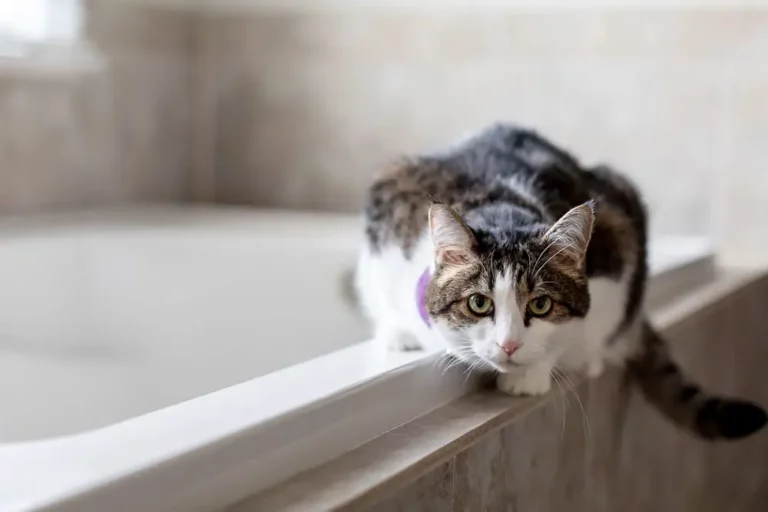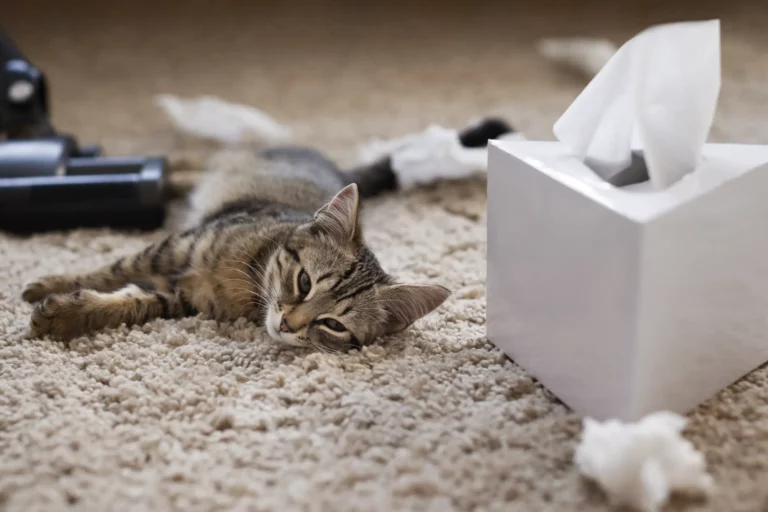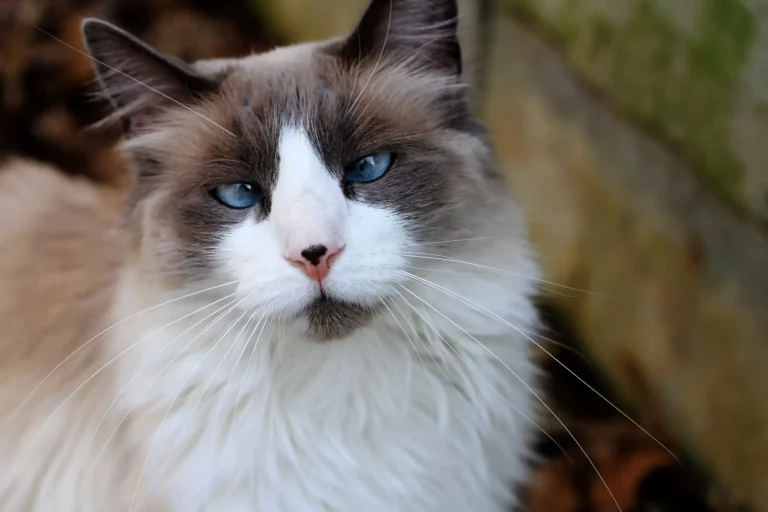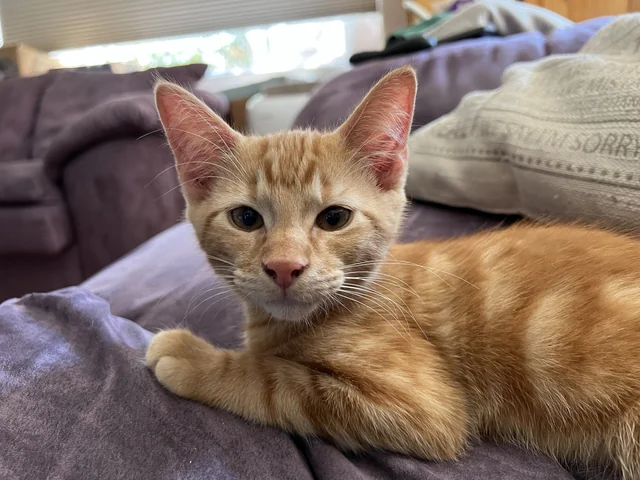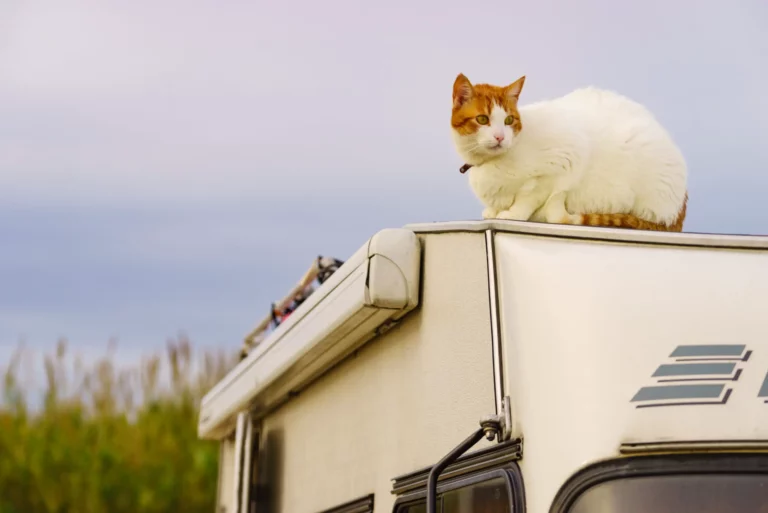Will a Cat Get Rid of Mice?
Is your home suddenly hosting uninvited guests in the form of mice? You’re not alone. Many homeowners struggle with this issue and wonder if their feline friends can assist in this matter.
In fact, the age-old question is, will a cat get rid of mice? tends to pop up quite frequently. In this comprehensive guide, we’ll delve into this intriguing topic and share insights from experts about the true potential of our four-legged friends when it comes to mouse control.
Stay tuned to learn whether your cat is a secret weapon in this tiny, yet challenging, household predicament.
Key Insights At a Glance
- Cats, due to their predatory instincts, can be helpful in controlling mice populations but effectiveness varies.
- Not all cats will hunt mice, some may merely observe or play with them.
- The presence and scent of a cat can deter mice, though not all.
- Cats might not eliminate significant mouse infestations; professional help may be needed.
- Borrowing a cat for mouse problems is an option, but results can vary.
- Cats can kill mice without any visible blood, due to their specific hunting technique.
Short Answer: While cats can help control a mice problem due to their predatory instincts and the deterrent effect of their presence and scent, they might not completely eliminate a significant mouse infestation. Their hunting effectiveness varies based on different factors. In some situations, professional pest control measures may be necessary
Cat vs Mouse: The Age-Old Relationship
Cats and mice have shared an intricate relationship throughout history. As instinctive hunters, cats have been utilized for centuries to control rodent populations, including mice. The innate predatory instinct of a cat is an age-old mechanism in the balance of nature.
But it’s essential to note that not every cat is a born mouser. Factors such as breed, upbringing, and individual personality play a significant role in a cat’s willingness and ability to hunt mice. For example, certain breeds like the American Shorthair, Maine Coon, and Siamese are renowned for their hunting prowess.
On the other hand, some cats might merely observe or play with mice, showcasing their playfulness rather than a killer instinct.
Even if your feline friend isn’t a pro mouser, they can still play a role in deterring mice. Mice have a keen sense of smell and can often detect the presence of a cat in the home. This can make them think twice about setting up residence in your house.
However, it’s important to understand that while a cat can contribute to reducing mice populations, they might not completely eliminate a severe mouse problem. Especially in cases of larger infestations, professional pest control measures could be necessary to fully eradicate the issue.
So, while the cat-mouse relationship can certainly come in handy, it’s not a guaranteed full-proof method for ridding your home of these pesky rodents.
How Cats Deter Mice
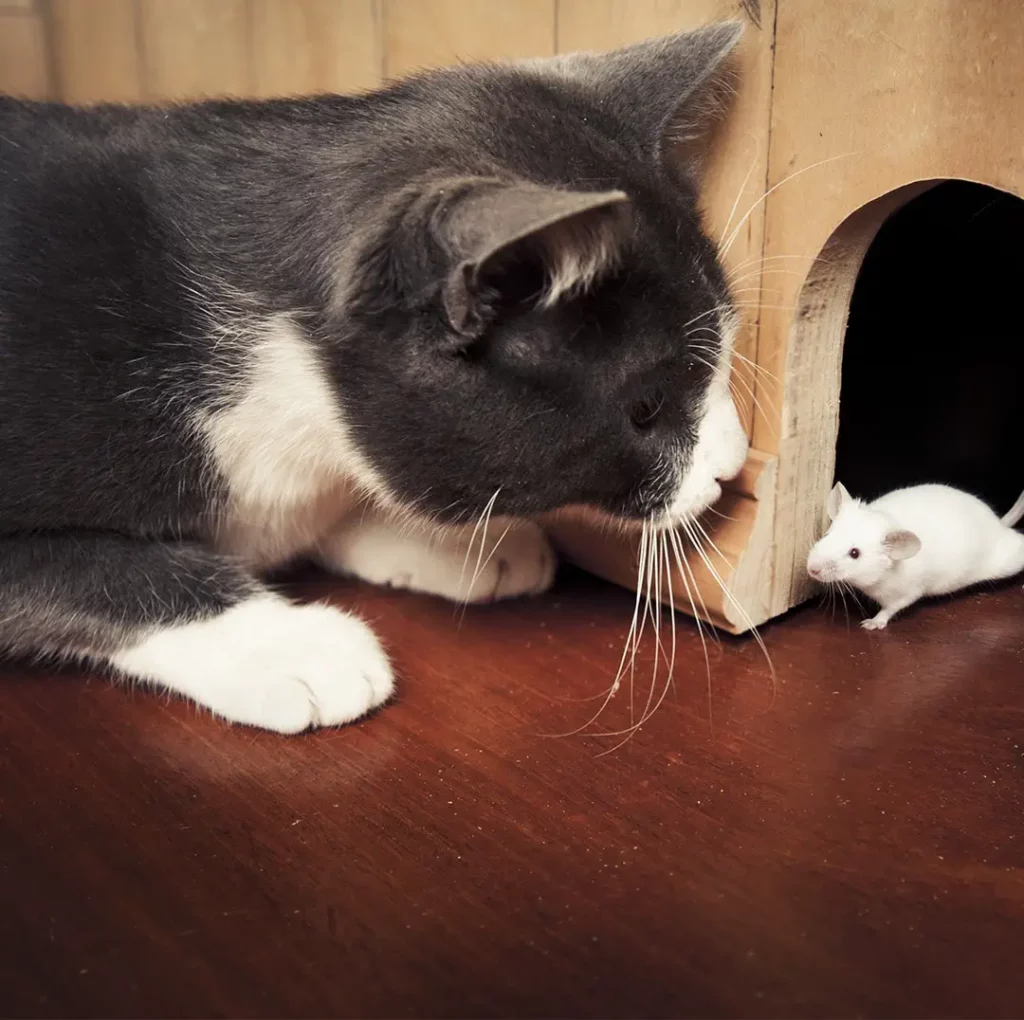
The sheer presence of a cat can act as a strong deterrent for mice. However, their ability to keep these rodents at bay extends beyond merely their presence. Cats are skilled predators with heightened senses that aid them in their hunting ventures.
- Sense of Hearing: Cats have exceptional hearing abilities, allowing them to hear the ultrasonic chirps of mice, which are inaudible to human ears. This skill can lead them straight to the source of the sound, giving mice fewer places to hide.
- Sense of Sight: Cats have excellent night vision. Mice, being nocturnal creatures, often venture out in the darkness. A cat’s enhanced ability to see in low light makes them efficient mouse hunters, even in the dead of night.
- Agility and Speed: The natural agility and speed of cats give them the upper hand when chasing and catching quick and elusive mice.
- Pheromones: Cats, like many animals, mark their territory with pheromones. These scent markers can act as a deterrent to mice. Simply put, a mouse will be less likely to nest in a home that smells of a potential predator.
Despite these hunting advantages, remember that not all cats will actively hunt or kill mice. Some may prefer to play with them or ignore them completely. It largely depends on the cat’s personality and previous experiences.
But, even those who choose not to engage directly can still deter mice through their scent marking and presence.
Why Some Cats Might Not Catch Mice
Not all cats are born mousers, and that’s okay. In the world of felines, individual personalities and experiences play a significant role in determining their interest and skill in catching mice.
- Breed: While it’s crucial to avoid stereotyping, certain breeds like the American Shorthair, Maine Coon, and Siamese are historically known for their mousing skills. That being said, any cat, regardless of breed, can exhibit strong predatory behaviors.
- Upbringing: Cats raised in urban apartments, away from a natural outdoor environment, may not develop the same hunting instincts as cats who’ve had more exposure to nature and its critters. Outdoor cats or those who’ve had previous hunting experiences are more likely to chase and catch mice.
- Age: Younger cats are often more curious and playful, making them more likely to engage with a mouse. On the other hand, senior cats might prefer a nap over a chase.
- Temperament: Some cats are simply more laid-back or less interested in hunting. They might watch a mouse scurry by with little more than a flick of their tail.
- Feeding: Cats well-fed on commercial diets may be less inclined to hunt for food, unlike their counterparts who may have had to hunt for sustenance.
Understanding your cat’s personality can help you set realistic expectations of their mousing abilities. Even if your cat doesn’t actively hunt mice, their presence can still act as a deterrent, and in conjunction with other pest control methods, it can be part of an effective solution.
Can Cats Completely Eliminate a Mouse Problem?
While the image of a cat chasing a mouse has become something of a cultural symbol, can our feline companions really rid our homes of a mouse infestation? The answer is not a simple yes or no.
Cats are undoubtedly skilled hunters, and their mere presence can certainly deter mice. Mice possess an acute sense of smell and can detect the presence of a predator like a cat. This may cause them to seek safer ground elsewhere.
However, relying solely on a cat to resolve a significant mouse problem may not be effective. Mice are incredibly resilient and resourceful. They breed rapidly, can squeeze through incredibly tiny openings, and are most active during the night when your cat may be sleeping.
They are also adept at hiding and can survive on just 3 grams of food a day, meaning even a small unnoticed crumb can be a feast for a mouse.
Moreover, not all cats have the same drive or ability to catch mice. For some cats, a running mouse might trigger a playful chase rather than a predator’s pounce. Some cats may even coexist with mice without causing them any harm, especially if they’ve been well-fed and don’t associate mice with food.
Therefore, while a cat can certainly be part of your integrated pest management strategy, they shouldn’t be your only line of defense. Professional pest control services, sealing entry points, and maintaining cleanliness are also crucial steps in ensuring your home is mouse-free.
It’s about creating an environment that’s unappealing to mice, and a cat can definitely contribute to this!
What to Do When You Have a Cat, But Still Have Mice
Having a cat but still seeing mice scurrying around can be quite frustrating. After all, you might have assumed that adopting a cat would solve your mouse problem. So, what do you do when the mice seem to be unfazed by your cat’s presence?
Firstly, understand that not all cats have the same hunting instincts. Just like us humans, cats also have their unique personalities. Some are born hunters, while others are more laid back. An older or overweight cat, for example, might prefer lounging around to chasing after mice.
Additionally, a well-fed cat may simply not feel the need to hunt. In the wild, cats hunt for food. But when food is readily available in their bowl, they may not see a mouse as a meal, but more as a plaything.
However, there are steps you can take to help motivate your cat. Try engaging their predatory instincts through play. Use toys that mimic the movement of mice to awaken their natural hunting behaviors. But remember, this should be done safely to avoid injury to your cat.
At the same time, it’s important to incorporate other pest control strategies. These could include sealing off entry points, keeping your home clean, and if necessary, seeking professional pest control help. In severe infestations, a multi-pronged approach is often necessary to eliminate the problem.
Lastly, while cats can be a useful deterrent, they should not be viewed as the sole solution to a mouse infestation. Their role in pest control is more about prevention rather than extermination. So if you’re dealing with an ongoing mouse problem, it’s best to consult with a professional pest control service.
Borrowing a Cat to Get Rid of Mice
While borrowing a cat to get rid of mice might seem like an ingenious solution, it’s not as straightforward as it appears. The effectiveness of this strategy hinges on several factors, the most significant of which is the cat’s hunting instinct.
If the cat is a proven mouser, having it around might indeed help deter mice. The smell of a predator can be a strong deterrent for these tiny rodents, often causing them to seek shelter elsewhere. Additionally, the physical presence of a cat can help keep mouse populations under control.
However, not every cat is a born hunter, and even if they are, it may take time for them to adjust to a new environment and begin hunting. Cats are territorial creatures and introducing them to a new space can cause stress, which might affect their hunting behavior.
Additionally, remember that cats are not a definitive solution to a mouse problem. While they can help control the population and act as a deterrent, they may not eliminate an infestation entirely, especially if the infestation is severe.
So, while borrowing a cat can help, it’s always best to pair this strategy with other methods of mouse control. It’s also essential to ensure the cat’s welfare during their stay in a new environment, as stress and discomfort can lead to behavioral issues.
Remember, professional pest control services are designed to manage infestations in an efficient and humane manner. If you’re facing a significant infestation, reaching out to professionals might be your best bet.
How Long Will a Mouse Hide from a Cat?
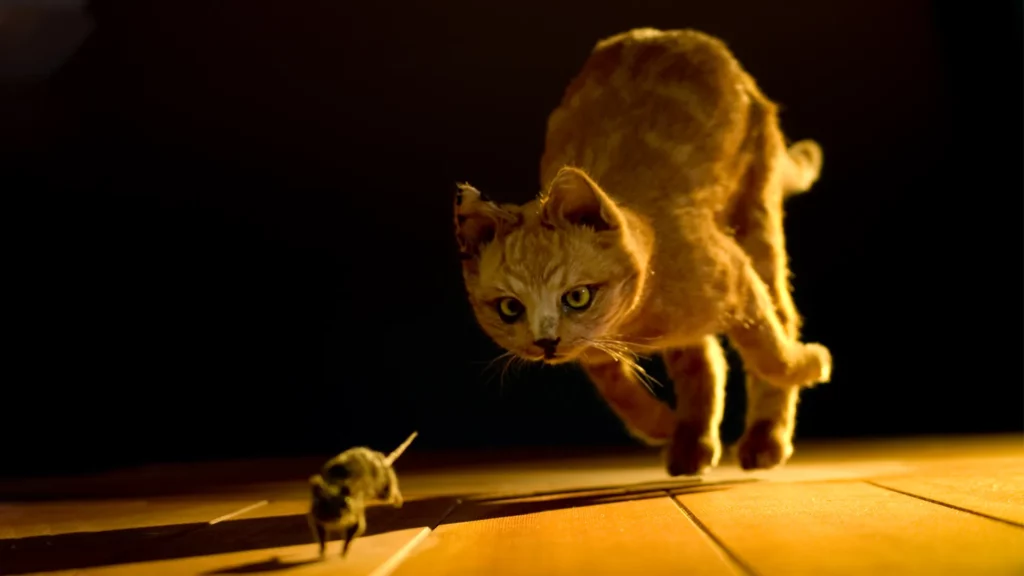
Mice are clever, adaptable creatures with a strong instinct for survival. When they sense the presence of a predator like a cat, they’ll naturally take measures to protect themselves. This includes hiding, staying still, and avoiding open spaces where they could be caught.
The length of time a mouse will hide from a cat can vary considerably and depends on factors such as the mouse’s familiarity with its surroundings, the cat’s hunting behaviors, and the availability of food and shelter for the mouse. Some mice may only hide for a few hours, while others could lay low for days if they feel threatened.
One study showed that the scent of a cat can influence mouse behavior for up to 14 days. During this time, mice may alter their feeding habits and even their reproductive behaviors to avoid becoming prey.
Mice can fit into surprisingly small spaces and they’re expert climbers, so they’ll often take refuge in walls, attics, basements, and other areas that are difficult for cats to access. If the mouse finds a secure, undisturbed location, it may choose to remain there until the perceived threat has passed.
However, remember that a mouse in hiding is not necessarily a mouse that’s been evicted. While a cat can make an environment less appealing for mice, it doesn’t necessarily solve the root of the problem.
To ensure a thorough solution to a mouse infestation, it’s often necessary to employ a multi-faceted approach that includes cleanliness, exclusion techniques, and professional pest control if necessary.
Will Mice Leave If They Smell a Cat?
The scent of a cat in the home can act as a significant deterrent for mice. Mice have a keen sense of smell, and they use it to detect potential threats in their environment. The presence of a predator’s scent, like that of a cat, can trigger fear and avoidance behaviors in mice.
Urine and fur are the primary carriers of a cat’s scent, both of which can signal danger to a mouse. A study published in the Journal of Chemical Ecology found that mice exposed to the scent of cat urine displayed fear and anxiety behaviors, suggesting that the smell alone could make an environment less appealing for a mouse.
However, it’s essential to keep in mind that while the scent of a cat may dissuade some mice, it might not be enough to get rid of a well-established mouse population.
Mice are survivalists, and they can become accustomed to the smell over time, especially if there’s an ample food source available. Therefore, while having a cat can contribute to controlling mouse activity, it shouldn’t replace comprehensive pest control strategies.
Lastly, remember that cats themselves can be attracted to mice, and their curiosity might lead to bringing live or dead mice into the house as ‘gifts.’ This can inadvertently provide mice with an entry point into your home, so be sure to monitor your cat’s outdoor activities and access points to your house.
Will a Fake Cat Keep Mice Away?
Deploying a fake cat to ward off mice might seem like a clever idea at first glance, but it might not be as effective as you’d hope. Mice primarily use their acute senses of smell and hearing to detect the presence of predators. A fake cat won’t produce the scent or sound of a real cat, making it relatively easy for mice to discern the difference.
According to the National Library of Medicine, rodents, including mice, use ultrasonic vocalizations to communicate danger. These vocalizations can be triggered by the smell or sound of a predator. Given that a fake cat can’t replicate these cues, it’s unlikely to be an effective deterrent.
Moreover, the presence of a cat (real or fake) won’t address the root causes of a mouse infestation, such as food sources or entry points into your home. Mice are adept survivalists and breeders, and they can quickly adapt to perceived threats if the conditions for survival are still favorable.
While a fake cat might offer some initial deterrent value, especially if it’s combined with a cat’s scent, it won’t replace a comprehensive and multi-pronged approach to mouse control.
As such, if you’re dealing with a persistent mouse problem, it might be worth considering other methods of prevention and control, including sealing entry points, proper food storage, and professional pest control services.
How Long Does It Take for a Cat to Kill a Mouse?
The length of time it takes for a cat to kill a mouse can vary widely and is primarily dependent on the individual cat’s hunting skills, instincts, and interest level in the mouse.
Cats are natural hunters with ingrained predatory instincts, but these can manifest differently in each cat. Some may leap into action immediately upon spotting a mouse, quickly catching and killing their quarry within moments.
However, others may prefer to toy with the mouse for a while, engaging in a drawn-out game of cat and mouse.
Remember that the act of hunting engages a cat’s cognitive and physical skills, serving as a form of mental and physical stimulation. It’s not just about the kill for them; it’s about the thrill of the chase as well.
In the wild, cats may also intentionally keep mice alive but are incapacitated to train their kittens in the art of hunting, leading to prolonged periods between catch and kill.
In contrast, other cats might not even kill the mouse at all, especially those that have been bred and raised as household pets and have had their basic needs met by their human caretakers.
While it’s difficult to pinpoint an exact timeframe for a cat to kill a mouse, it’s essential to note that your feline friend’s presence and hunting behavior can still act as a significant deterrent to mice, who are keen on avoiding potential threats in their environment.
How Do Cats Kill Mice Without Blood?
Ever wondered how your cat can hunt and kill mice without leaving a trace of blood? The secret lies in the cat’s unique hunting technique and anatomy.
The cat’s bite is designed to deliver a lethal blow to its prey, primarily targeting the critical regions such as the neck or spine, which can result in an instant kill without causing noticeable bloodshed.
Firstly, let’s talk about a cat’s anatomy. Cats have sharp, pointed teeth designed for biting and holding onto their prey. The canine teeth, in particular, are suited for delivering a killing bite. These teeth can cause damage to vital parts like the spinal cord or windpipe, leading to a quick and often bloodless death for the mouse.
Moreover, cats are stalk-and-pounce predators. They tend to observe their prey closely, calculate the right moment to strike, and then pounce with precision. Once the cat captures the mouse, it usually delivers a ‘killing bite’, typically at the back of the mouse’s neck.
This bite is designed to sever the spinal cord or crush the windpipe, leading to instant death.
The result of this method is an efficient kill with minimal bloodshed. However, it’s important to remember that not all cats are expert hunters, and some may not execute this technique perfectly.
If you prefer that your cat not engage in hunting, providing them with interactive toys can offer a suitable alternative for their instinctual stalking and pouncing behaviors.
Cleanliness, Food Sources, and Other Factors at Play
While cats can be a helpful deterrent against mice, they are not the only solution. There are other vital strategies to consider when dealing with a mouse problem, including maintaining cleanliness, removing food sources, and considering professional pest control.
Cleanliness is paramount in keeping mice at bay. Mice are attracted to clutter, as it provides them with plenty of hiding spots. Ensuring your home, especially the areas where your cat cannot access, remains clutter-free can discourage mice from setting up their nests.
Food sources are another major attraction for mice. They will go where the food is. Keep your food sealed in airtight containers, clean up food crumbs and spills immediately, and take out the trash regularly. If there’s no food available, mice are less likely to invade your home.
Additionally, consider cat-safe pest control methods. While your feline friend might be a great hunter, sometimes professional help might be necessary, especially in the case of a large infestation.
There are many pest control options that are safe for pets. These methods can work alongside your cat’s hunting efforts to ensure your home stays mouse-free.
Lastly, always keep in mind the potential health risks associated with cats hunting mice. Mice can carry diseases that could potentially be harmful to your cat. Regular vet check-ups and preventative treatments can help keep your cat safe while they patrol your home for unwanted pests.
Remember, the goal is not only to get rid of the mice but also to make your home unattractive to them in the first place. By combining your cat’s natural hunting abilities with these additional strategies, you can make your home a fortress against these unwelcome guests.
Other Solutions for Mouse Control
While our feline companions can certainly aid in managing a mouse problem, it’s essential to approach this issue with a comprehensive plan that goes beyond just your cat’s predatory instincts. Here are some additional methods to consider for a mouse-free home:
- Ultrasonic Devices: These devices emit high-frequency sounds that are unpleasant to rodents, driving them away. While this method has mixed reviews, some homeowners find them effective.
- Professional Pest Control Services: Sometimes, the mouse problem might be too large for a cat to handle alone, especially in severe infestations. In such cases, hiring professional pest control services can ensure the thorough elimination of rodents.
- Trapping: Traps, both lethal and catch-and-release types, can be useful tools in controlling a mouse population. Remember to check them regularly and place them in areas where you notice mouse activity.
- Sealing Entry Points: Mice can squeeze through small cracks and holes. Inspect your home’s exterior for any potential entry points and seal them to prevent mice from gaining access.
- Poison: While effective, this method should be used with extreme caution if you have pets or children in the house. Only use poisons in areas inaccessible to your cat to prevent accidental ingestion.
Remember, the goal is to keep your home as uninviting as possible to rodents. Consistent cleanliness, removing easy food sources, and having your cat around can certainly help, but these other methods can further enhance your chances of a rodent-free home.
Always consult with a professional if you’re unsure of the best course of action. Your home is a sanctuary for you and your pets, and it should remain that way.
Potential Risks for Cats and Humans
Let’s not forget that while cats can be effective mouse deterrents, they’re not immune to the potential health risks associated with hunting and consuming rodents.
Parasites: Mice can carry various parasites, like ticks and fleas, which can easily transfer to your cat during a hunt. Regular preventative treatments can help keep these parasites at bay.
Diseases: Rodents are known vectors for diseases such as toxoplasmosis and hantavirus, which can pose a health risk to both cats and humans. While it’s rare for cats to transmit these diseases to humans, it’s still a concern worth considering.
Ingesting Poison: If a mouse has consumed poison before becoming your cat’s prey, there’s a risk that the poison could harm your cat. This is known as secondary poisoning and can be very serious if not addressed promptly.
Bacterial Infections: Rodent bites and scratches can cause bacterial infections in cats. If you notice your cat has been injured during a hunt, immediate veterinary care is necessary to prevent complications.
As always, maintaining regular veterinary care for your cat is crucial, especially if they are active hunters. Regular check-ups and discussions about your cat’s lifestyle can help your vet provide the best preventative care to keep your feline friend safe.
For humans, it’s essential to be vigilant and maintain good hygiene practices, especially when cleaning up after a successful cat hunt. Wear gloves, wash hands thoroughly, and avoid direct contact with any deceased rodents to reduce the risk of disease transmission.
Remember, your cat’s health and your own are of utmost importance. Balancing the advantages of a cat’s natural hunting instincts with the potential risks it brings is crucial for a happy and healthy household.
Frequently Asked Questions (FAQs)
Do cats eat mice or just kill them?
While some cats will eat their prey, others may simply kill them, often as part of their instinctual hunting behavior. Some cats may even bring the mouse to their owners, a behavior often seen as the cat presenting a “gift.”
Will a mouse return if it smells a cat?
Mice generally avoid areas where they smell a predator, including cats. However, if a mouse has established a nest or found a reliable food source, it may risk returning despite the cat’s scent.
Can a mouse make a cat sick?
Yes, there are several health risks for cats who hunt mice, including the transmission of parasites, diseases, and the risk of secondary poisoning if the mouse has consumed poison.
How effective are cats at catching mice?
The effectiveness of cats at catching mice can vary widely, depending on factors such as the cat’s age, breed, personality, and prior experience with hunting.
Are certain breeds of cats better at catching mice than others?
Some breeds like the Siamese, Maine Coon, and American Shorthair are known for their hunting skills, but individual cat’s personalities and experiences can make a significant difference.
Can cats get rid of rats as well as mice?
While cats can deter both rats and mice, rats are generally larger and more aggressive, making them more challenging prey for cats.
What should I do if my cat catches a mouse?
If your cat catches a mouse, make sure to dispose of the mouse properly and clean the area. Check your cat for any signs of injury and watch for any changes in behavior, which could indicate illness.
Do cats scare away mice even if they don’t hunt them?
Yes, the presence and scent of a cat can act as a deterrent to mice, even if the cat doesn’t actively hunt them.
Will mice enter a house if they smell a cat?
Mice tend to avoid areas where they smell predators, such as cats. However, if resources are scarce outside, they might risk entering a home even if they detect a cat’s presence.
Are there any health risks for humans if a cat brings a mouse into the house?
There can be health risks if a cat brings a mouse into the house, particularly if the mouse carries diseases or parasites. It’s essential to dispose of the mouse safely and clean the area thoroughly.
Can mice sense cats?
Yes, mice can sense the presence of cats through their scent and will usually try to avoid areas where cats live.
Will cats keep rats and mice away?
The presence of a cat can deter rats and mice, but it might not completely solve a severe infestation problem. It’s always best to consult a pest control professional for severe rodent issues.
Concluding Thoughts
“Will a cat get rid of mice?” is a question that hinges on many variables including the cat’s hunting drive, the mouse’s resilience, and the shared environment. While cats can deter mice through their predatory instincts, their effectiveness can vary greatly based on their breed, age, and individual character.
Although cats can assist in controlling a mouse problem, they may not entirely eliminate a severe infestation. Comprehensive solutions involving cleanliness, food security, entry-point sealing, and professional pest control could be necessary.
Considering the health risks, both cats and humans can be affected. Hunting cats are at risk of contracting diseases, parasites, or secondary poisoning, while humans could potentially face health risks from mice brought inside.
To summarize, cats can contribute to mouse control, but shouldn’t be the sole solution, especially in larger infestations. Instead, they should be a part of an integrated approach that ensures both a rodent-free home and a safe, satisfying environment for the cat.
References
- “Do Cats Keep Mice Away?” – Aptive Environmental
- “Will Getting a Cat Get Rid of Mice?” – Victor Pest
- “Can Cats Get Rid of Mice?” – Terminix
- “Will Mice Stay Away If You Have Cats?” – Midway Pest Management
- “Rodents and their Management” – ICWDM Handbook Series

